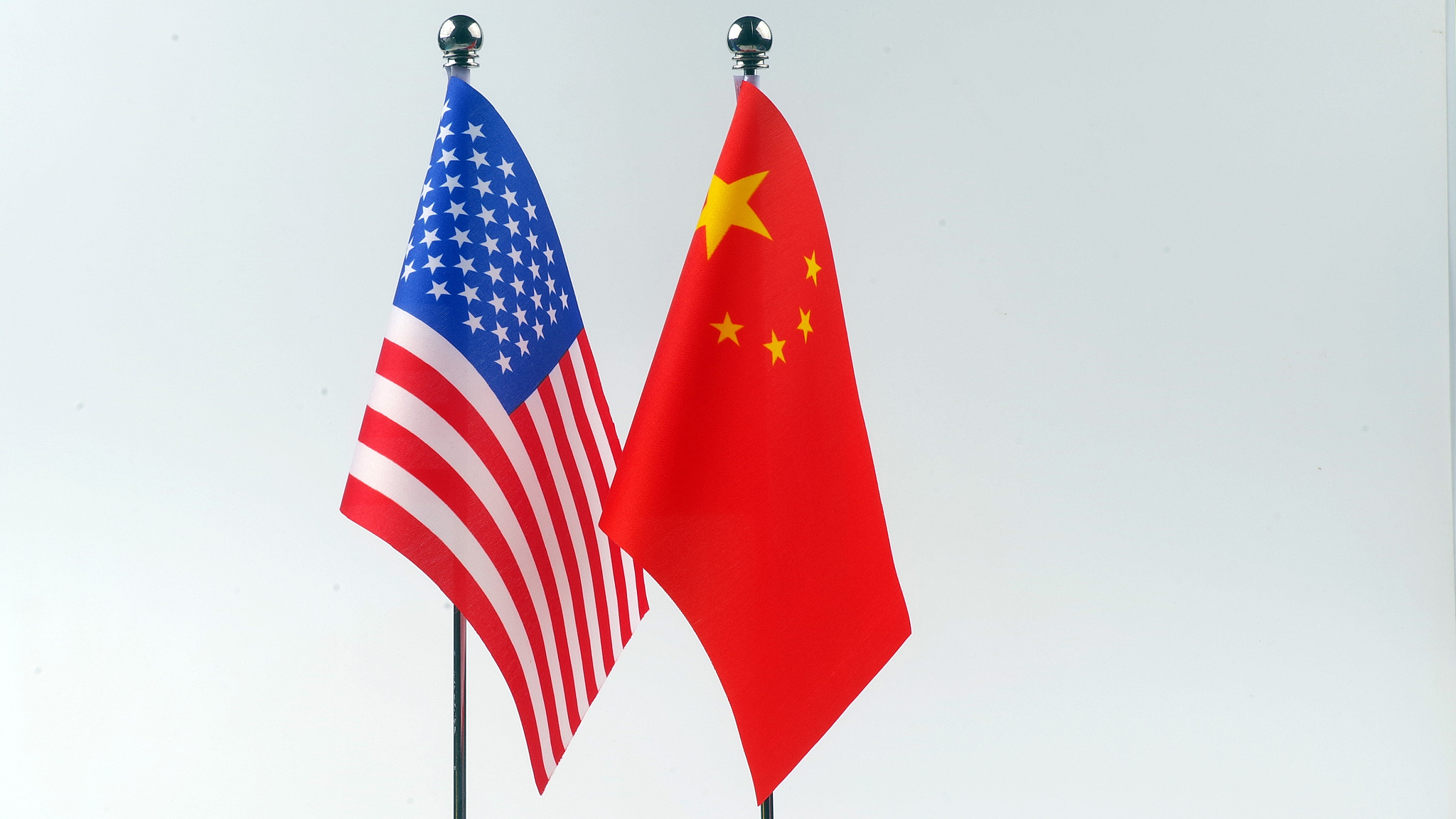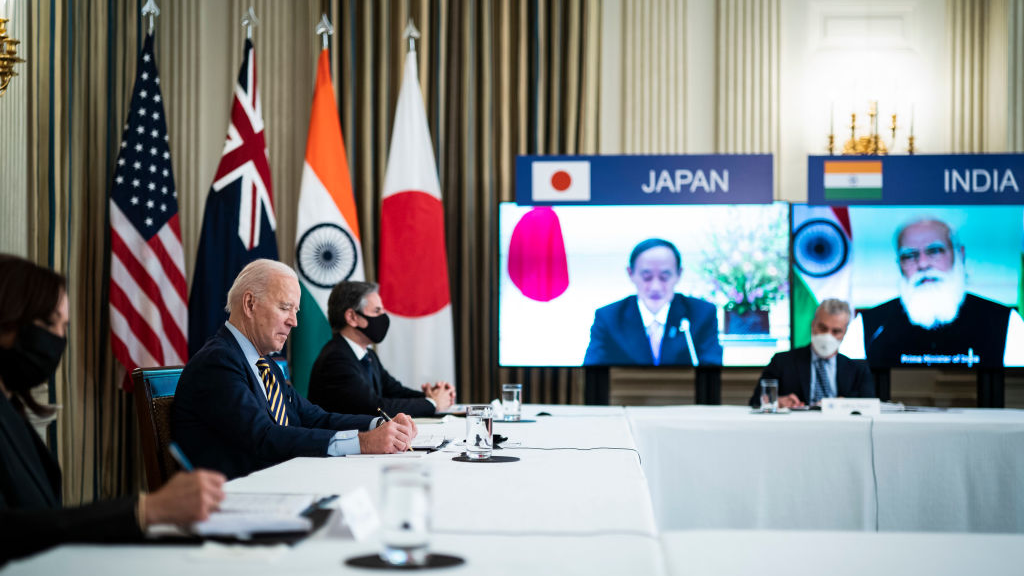
Editor's note: Azhar Azam works in a private organization as market & business analyst and writes about geopolitical issues and regional conflicts. The article reflects the author's opinions and not necessarily the views of CGTN.
In the bone-chilling cold of Anchorage in the U.S. state of Alaska, close to halfway between Beijing and Washington, the heated discussion between American and Chinese top diplomats is underway. Alaskans, whose economy is highly dependent on trade with other countries including China, are being emboldened to offer a warm welcome.
After returning from a trip to Asia, the U.S. Secretary of State Antony Blinken and National Security Advisor Jake Sullivan meet Yang Jiechi, a member of the Political Bureau of the Communist Party of China (CPC) Central Committee and director of the Office of the Foreign Affairs Commission of the CPC Central Committee, and Chinese State Councilor and Foreign Minister Wang Yi.
Washington predicts a "difficult conversation" with "a long litany of disagreements" while Beijing hopes to manage differences and bring the China-U.S. relationship back on track.
Even if outcomes of the first China-U.S. in-person talks since the U.S. President Joe Biden took over do not result in a major breakthrough on deep-seated issues, an agreement on global challenges such as climate change and global health security can show the way to patch things up on other disputes like trade and technology and set the direction for future engagement between the world's leading economies.
Prior to the meeting, Blinken said that the U.S. does not intend for "a series of follow-on engagements" at this point. As Biden wants to lead with diplomacy and given avenues of cooperation, where he promised to welcome China, cannot be achieved by a one-off conversation, it is crucial for the U.S. president to keep Beijing engaged or his call to defuse the international threats through collaborative response will be seen as brinkmanship by the world.
The convergent views on shared concerns are great but open-door policy must be pursued to make progress on all frictional issues. Washington has finally recognized that its relations with Beijing in coming years would encompass cooperation and not just all-out competition. So by keeping the deliberations alive, a much-needed working relationship can be constructed and strengthened.
In addition, the process to reach a bilateral consensus on complex issues shouldn't be time-barred as not all of those can necessarily be realized quickly. Resolution to disputes sometimes takes years of untiring diplomatic efforts while ensuring the two economies do not decouple. The China-European Union (EU) investment deal is one good example of how the two sides prevented closing off all channels, sticked to consistent dialogue, maintained economic and trade ties and finally secured a symbiotic pact after seven years of marathon talks.
Ahead of the big talks, Biden hastily looked to promote the core of his foreign policy, aligning the U.S. allies against China. Earlier, he held a first-ever leadership summit of the Quad along with prime ministers of Australia, India and Japan. The U.S. president also sent Blinken and Secretary of Defense Lloyd Austin to Tokyo and Seoul to show off strong support from American partners.
Japan and the Republic of Korea (ROK) have been long-time U.S. allies but struggle to tide over deep divisions amid fraying relations over latter's court rulings in 2019, ordering Japanese companies to pay compensation for forced labor during World War II. Meanwhile, their economic and trade relations with China continue to grow. The joint statements in Tokyo and Seoul may for now catch some media hype to the U.S. favor, however serious bilateral Japan-ROK rifts and their economic interests with China could blow up the regional plans in the long run.
Washington is keen to sign up South Korea to the Quad, but Seoul does not want to join the anti-China alliance that could provoke its largest economic partner and the Democratic People's Republic of Korea ally. As observers say Seoul's motive is not to balance against Beijing, it would be more interested in improving the regional security environment through peace with China, which often played a key role in bringing Pyongyang to nuclear talks.

President Joe Biden meets virtually with the Quad in the State Dining Room at the White House, Washington, D.C., March 12, 2021. /Getty
President Joe Biden meets virtually with the Quad in the State Dining Room at the White House, Washington, D.C., March 12, 2021. /Getty
The EU is the other key target of the U.S. administration's strategy to contain China. Biden and his aides cast doubts on implementation of the China-EU investment agreement. But unlike Washington that seeks to build a transatlantic alliance to cap China's rise, Beijing is committed to fulfill every single commitment of the deal; bolster support for shared priority issues such as climate change, reforms of the United Nations and Middle East and stand by Brussels in efforts to take a bigger role in global affairs.
Bringing like-minded countries on the same wavelength or an approach to see the U.S. allies as "force multipliers" recalls the U.S. cold war mentality. The U.S. needs to review and alter its thoughts as China is now the cornerstone of the global economy, deeply integrated with the U.S. economy.
Moreover, the nations today are deeply unattractive toward a Cold War 2.0 and have grown up enough to avoid becoming the center of global geopolitics. The COVID-19 has made them realize that all states should settle disputes through dialogue and focus on restoring the global economy as well as fighting climate change and pandemics to make the world more secure for mankind.
In a globalized world, there is no place for outdated and confrontational ideology. Finding commonalities by American and Chinese negotiating teams is the best way to mitigate differences and protect interests of the two. Any attempt to establish "ground rules" and draw "red lines" for the China-U.S. relationship will not replicate Chinese positive response to send its top diplomats to the U.S.
A truce in diplomatic war and unanimity to discuss all issues are two of the major points that are supposed to be high on agenda since tense relations cannot be calmed unless counterparts agree on softening attitude, ending interference in each other internal affairs, dispelling misunderstandings and continuing dialogue on all frictional matters.
The bottom line is that the U.S. need not use gatherings as a bulwark against China like it did to gain leverage in Anchorage talks. The Biden administration should read the global pulse and show intent to discuss all issues, agree to continue the dialogue to build on the all-important negotiation and make sincere efforts to translate it into a success for his country, China and the whole world.
(If you want to contribute and have specific expertise, please contact us at opinions@cgtn.com.)

